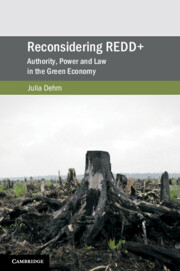Book contents
- Reconsidering REDD+
- Cambridge Studies on Environment, Energy and Natural Resources Governance
- Reconsidering REDD+
- Copyright page
- Contents
- Acknowledgements
- Abbreviations
- Introduction
- 1 Background to REDD+
- 2 Asserting Global Authority over the Carbon Sequestration Potential of Forests
- 3 Actualising Authority through Public and Private Law
- 4 Responsibility and Capacity
- 5 Scale, Multilevel Governance and the Disaggregation of Property Rights in REDD+
- 6 REDD+ at the ‘Local’ Level
- 7 Conclusion
- Bibliography
- Index
3 - Actualising Authority through Public and Private Law
REDD+ through the Lens of Property and Contract
Published online by Cambridge University Press: 13 May 2021
- Reconsidering REDD+
- Cambridge Studies on Environment, Energy and Natural Resources Governance
- Reconsidering REDD+
- Copyright page
- Contents
- Acknowledgements
- Abbreviations
- Introduction
- 1 Background to REDD+
- 2 Asserting Global Authority over the Carbon Sequestration Potential of Forests
- 3 Actualising Authority through Public and Private Law
- 4 Responsibility and Capacity
- 5 Scale, Multilevel Governance and the Disaggregation of Property Rights in REDD+
- 6 REDD+ at the ‘Local’ Level
- 7 Conclusion
- Bibliography
- Index
Summary
This chapter explores how a global claim to authority over forested land has been materialised or made real through an examination of the private law mechanisms that structure the REDD+ scheme, namely the creation of new quasi-property rights in carbon and the establishment of new contractual relations. It examines REDD+ through the lens of contract to show the key norm-production role played by actors involved in developing template or standard form contracts, focusing on the role of the World Bank carbon funds. It also examines REDD+ through the lens of property in order to highlight how the initial unequal distribution of carbon rights through the UNFCCC processes has shaped the political economy of carbon markets. By doing so, it shows why it is necessary to disrupt the constructed public–private dichotomy to provide a more comprehensive account that shows how REDD+ is co-constituted by both public and private law.
Keywords
- Type
- Chapter
- Information
- Reconsidering REDD+Authority, Power and Law in the Green Economy, pp. 168 - 211Publisher: Cambridge University PressPrint publication year: 2021

